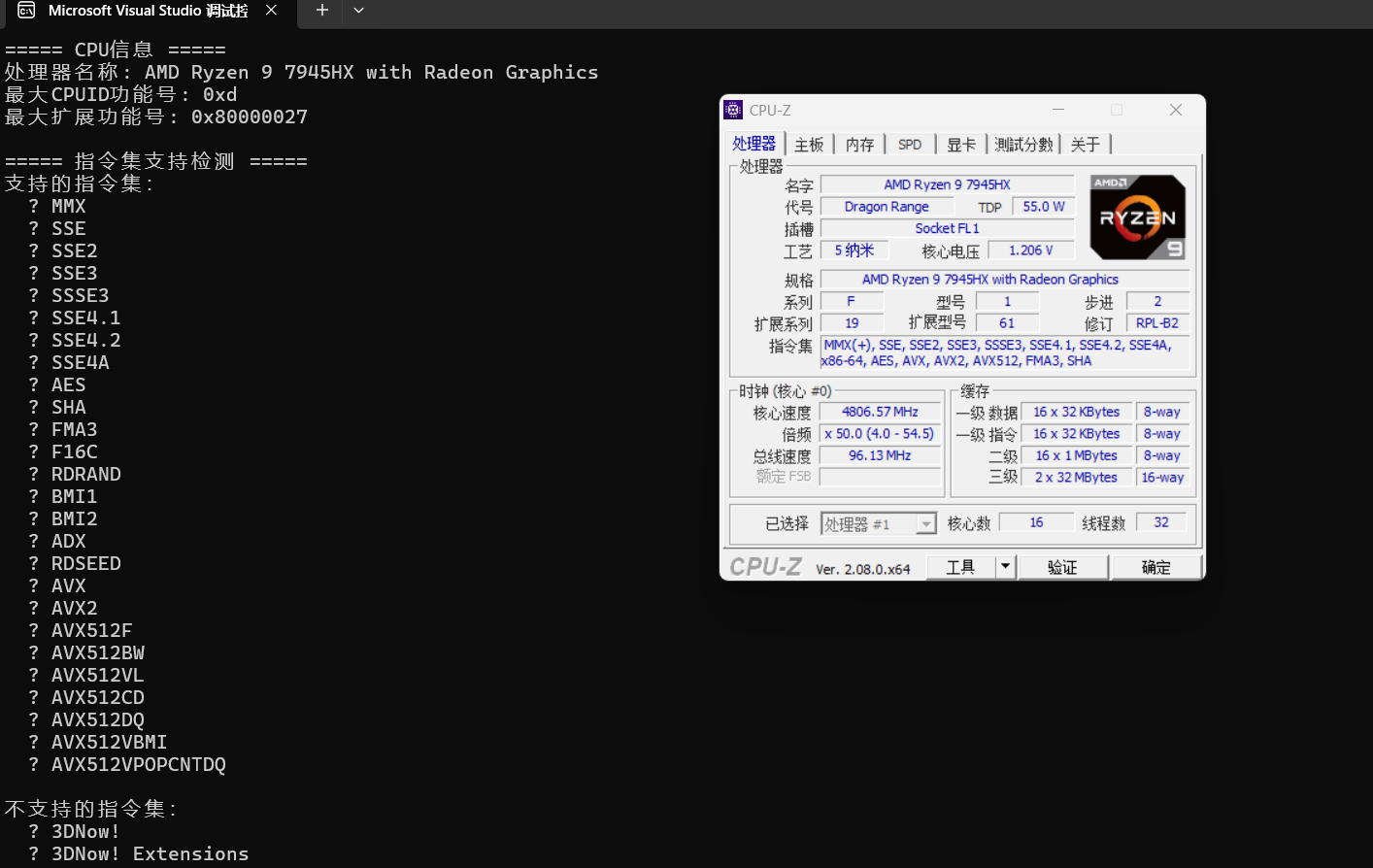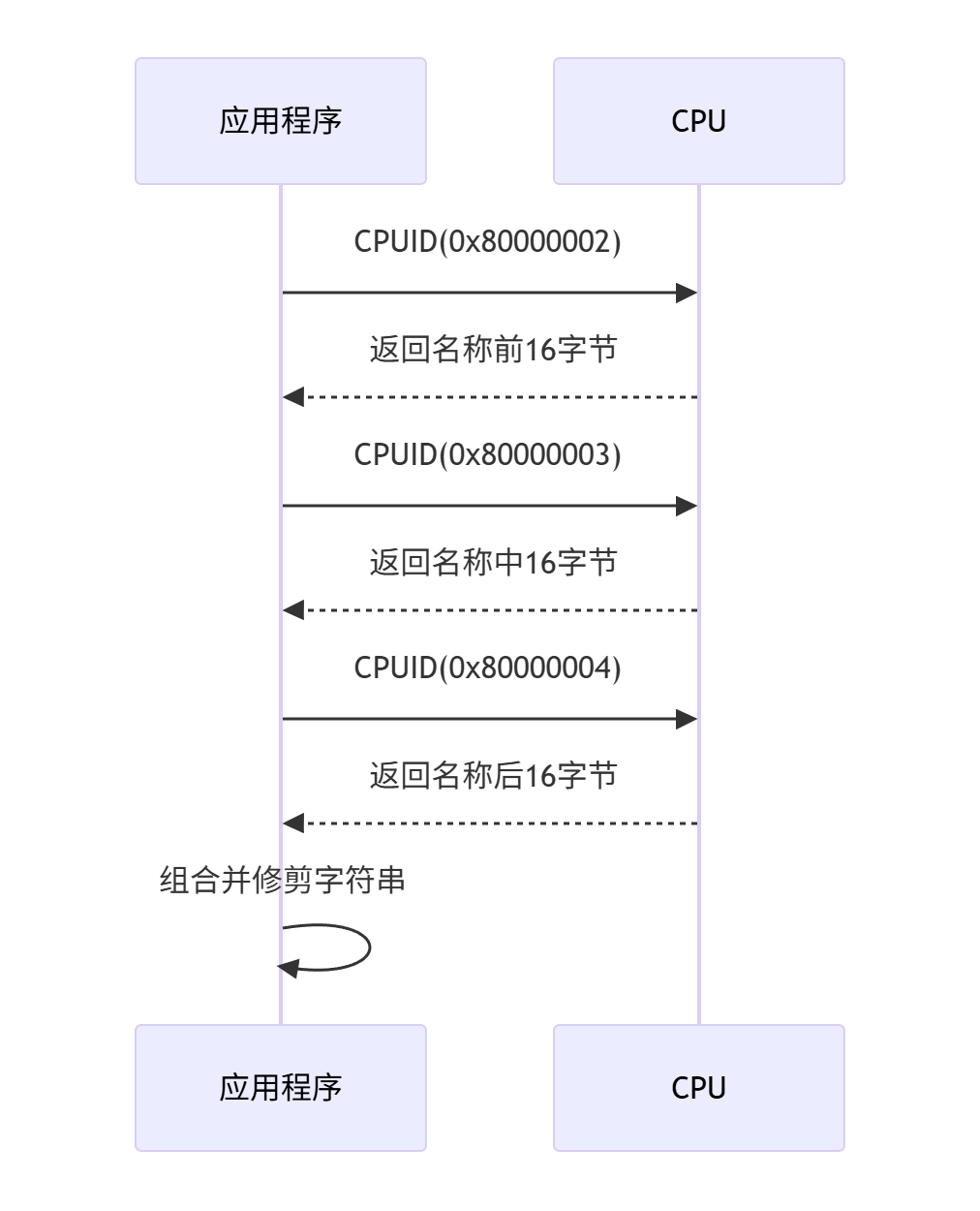VC++ CPU指令集检测工具实现原理
📈 VC++ CPU指令集检测工具实现原理
例图:

🧠 1. 核心原理:CPUID指令
// 使用CPUID指令获取CPU信息
int cpuInfo[4] = { -1 };
__cpuid(cpuInfo, 0); // 调用CPUID指令
int nIds = cpuInfo[0]; // 获取最大标准功能号
CPUID指令工作流程
🛠 2. 操作系统支持检测
// 检测操作系统对AVX的支持
bool CheckOSAVXSupport() {unsigned long long xcr0 = _xgetbv(0); // 获取XCR0寄存器值return (xcr0 & 6) == 6; // 检查XMM和YMM状态位
}
XGETBV指令作用
| 寄存器位 | 含义 | 所需值 |
|---|---|---|
| 位1 (XMM) | SSE状态管理 | 1 |
| 位2 (YMM) | AVX状态管理 | 1 |
| 位5-7 (ZMM) | AVX512状态管理 | 111 |
📛 3. CPU名称获取实现
std::string GetCPUName() {std::array<int, 4> cpuidData;char cpuName[49] = {0};// 分三次获取48字节名称__cpuid(cpuidData.data(), 0x80000002);memcpy(cpuName, cpuidData.data(), 16);__cpuid(cpuidData.data(), 0x80000003);memcpy(cpuName + 16, cpuidData.data(), 16);__cpuid(cpuidData.data(), 0x80000004);memcpy(cpuName + 32, cpuidData.data(), 16);return std::string(cpuName);
}
CPU名称获取流程

🔍 4. 指令集检测机制
// 检测SSE4.2支持
if (ecx & (1 << 20)) supported.push_back("SSE4.2");
else unsupported.push_back("SSE4.2");// 检测AVX512支持
if (nIds >= 7 && (ebx & (1 << 16))) {if (CheckOSAVX512Support())supported.push_back("AVX512F");elseunsupported.push_back("AVX512 (OS未启用)");
}
关键寄存器位映射表
| 指令集 | 寄存器 | 位位置 |
|---|---|---|
| SSE | EDX | 25 |
| SSE2 | EDX | 26 |
| SSE3 | ECX | 0 |
| AVX | ECX | 28 |
| AVX2 | EBX | 5 |
| AVX512F | EBX | 16 |
| AES | ECX | 25 |
| SHA | EBX | 29 |
⚙ 5. 完整工作流程
💡 6. 关键技术点
CPUID功能号策略
- 基本功能号:0x0-0x1F,通过EAX=0获取最大功能号
- 扩展功能号:0x80000000-0x800000FF,通过EAX=0x80000000获取最大扩展号
寄存器位检测技巧
// 位掩码检测示例
if (edx & (1 << 25)) // 检测SSE支持
if (ecx & (1 << 28)) // 检测AVX支持
操作系统支持检测必要性
// 硬件支持但OS未启用的处理
if (ecx & (1 << 28)) { // AVX硬件支持if (CheckOSAVXSupport()) // 标记为支持else // "AVX (硬件支持但操作系统未启用)"
}
📊 7. 指令集检测逻辑优化
检测逻辑改进方案
// 更清晰的条件判断结构
#define CHECK_FEATURE(reg, bit, name) \if (reg & (1 << bit)) \supported.push_back(name); \else \unsupported.push_back(name);// 使用示例
CHECK_FEATURE(edx, 25, "SSE")
CHECK_FEATURE(ecx, 0, "SSE3")
AVX512子集检测优化
// 更系统的AVX512检测
if (osAvx512Support) {const std::vector<std::pair<int, std::string>> avx512Features = {{30, "AVX512BW"}, {31, "AVX512VL"}, {28, "AVX512CD"}, {17, "AVX512DQ"}};for (const auto& [bit, name] : avx512Features) {if (ebx & (1 << bit)) supported.push_back(name);}
}
🎯 8. 技术挑战与解决方案
跨平台兼容性问题
| 问题 | 解决方案 |
|---|---|
| 内联汇编差异 | 使用编译器内置函数__cpuid |
| XGETBV实现 | 条件编译处理不同编译器 |
| 寄存器访问 | 抽象为平台无关接口 |
CPU名称格式化处理
// 原始名称包含多余空格的处理
std::string name(cpuName);
size_t end = name.find_last_not_of(' ');
return (end == std::string::npos) ? name : name.substr(0, end + 1);
📈 9. 应用场景与扩展
典型应用场景
- 运行时指令集优化路径选择
- 软件安装环境检测
- 虚拟化环境兼容性检查
- 高性能计算环境配置验证
功能扩展建议
// 添加缓存信息检测
__cpuid(cpuidData.data(), 0x80000006);
int cacheInfo = cpuidData[2];
int L2Cache = (cacheInfo >> 16) & 0xFFFF; // 获取L2缓存大小// 添加核心数量检测
__cpuid(cpuidData.data(), 0x80000008);
int cores = (cpuidData[2] & 0xFF) + 1; // 获取物理核心数
🏁 10. 总结
本文剖析的CPU指令集检测工具通过CPUID指令和操作系统寄存器检查,实现了全面的处理器能力检测。关键技术点包括:
- 分层检测策略:硬件支持 → OS支持 → 实际可用
- 模块化设计:CPU名称、基本指令集、扩展指令集分离检测
- 健壮性处理:功能号边界检查、名称格式化
- 扩展性设计:易于添加新指令集检测
🛠 11. 完整例程代码
#include <iostream>
#include <vector>
#include <string>
#include <intrin.h>
#include <array>// 检查操作系统对AVX的支持
bool CheckOSAVXSupport() {unsigned long long xcr0 = 0;
#if (_MSC_FULL_VER >= 160040219) // VS2010 SP1 或更高版本xcr0 = _xgetbv(0);
#else__asm {xor ecx, ecx_emit 0x0f_emit 0x01_emit 0xd0 // xgetbvmov dword ptr[xcr0], eaxmov dword ptr[xcr0 + 4], edx}
#endifreturn (xcr0 & 6) == 6; // 检查XMM和YMM状态支持
}// 检查操作系统对AVX512的支持
bool CheckOSAVX512Support() {unsigned long long xcr0 = 0;
#if (_MSC_FULL_VER >= 160040219)xcr0 = _xgetbv(0);
#else__asm {xor ecx, ecx_emit 0x0f_emit 0x01_emit 0xd0 // xgetbvmov dword ptr[xcr0], eaxmov dword ptr[xcr0 + 4], edx}
#endifreturn (xcr0 & 0xE0) == 0xE0; // 检查ZMM状态支持
}// 获取CPU名称
std::string GetCPUName() {std::array<int, 4> cpuidData;char cpuName[49] = { 0 }; // 48字符名称 + 空终止符// 获取处理器品牌字符串__cpuid(cpuidData.data(), 0x80000002);memcpy(cpuName, cpuidData.data(), sizeof(cpuidData));__cpuid(cpuidData.data(), 0x80000003);memcpy(cpuName + 16, cpuidData.data(), sizeof(cpuidData));__cpuid(cpuidData.data(), 0x80000004);memcpy(cpuName + 32, cpuidData.data(), sizeof(cpuidData));// 去除多余空格std::string name(cpuName);size_t end = name.find_last_not_of(' ');return (end == std::string::npos) ? name : name.substr(0, end + 1);
}int main() {// 获取CPU信息std::string cpuName = GetCPUName();int cpuInfo[4] = { -1 };__cpuid(cpuInfo, 0);int nIds = cpuInfo[0];// 获取扩展功能信息__cpuid(cpuInfo, 0x80000000);int nExIds = cpuInfo[0]; // 扩展功能的最大ID号std::vector<std::string> supported;std::vector<std::string> unsupported;// 获取CPU基本信息__cpuid(cpuInfo, 1);int ecx = cpuInfo[2];int edx = cpuInfo[3];// 获取扩展功能信息int ebx = 0, ecx_ext = 0, edx_ext = 0;if (nIds >= 7) {__cpuidex(cpuInfo, 7, 0);ebx = cpuInfo[1];ecx_ext = cpuInfo[2];edx_ext = cpuInfo[3];}// 输出CPU信息std::cout << "===== CPU信息 =====" << std::endl;std::cout << "处理器名称: " << cpuName << std::endl;std::cout << "最大CPUID功能号: 0x" << std::hex << nIds << std::dec << std::endl;std::cout << "最大扩展功能号: 0x" << std::hex << nExIds << std::dec << std::endl;std::cout << "\n===== 指令集支持检测 =====" << std::endl;// 检查MMXif (edx & (1 << 23)) supported.push_back("MMX");else unsupported.push_back("MMX");// 检查SSE系列if (edx & (1 << 25)) supported.push_back("SSE");else unsupported.push_back("SSE");if (edx & (1 << 26)) supported.push_back("SSE2");else unsupported.push_back("SSE2");if (ecx & (1 << 0)) supported.push_back("SSE3");else unsupported.push_back("SSE3");if (ecx & (1 << 9)) supported.push_back("SSSE3");else unsupported.push_back("SSSE3");if (ecx & (1 << 19)) supported.push_back("SSE4.1");else unsupported.push_back("SSE4.1");if (ecx & (1 << 20)) supported.push_back("SSE4.2");else unsupported.push_back("SSE4.2");// 检查SSE4A - 修复后的版本if (nExIds >= 0x80000001) {__cpuid(cpuInfo, 0x80000001);if (cpuInfo[2] & (1 << 6)) supported.push_back("SSE4A");else unsupported.push_back("SSE4A");}else {unsupported.push_back("SSE4A (扩展功能号不可用)");}// 检查AESif (ecx & (1 << 25)) supported.push_back("AES");else unsupported.push_back("AES");// 检查SHAif (nIds >= 7 && (ebx & (1 << 29))) supported.push_back("SHA");else unsupported.push_back("SHA");// 检查FMAif (ecx & (1 << 12)) supported.push_back("FMA3");else unsupported.push_back("FMA3");// 检查F16Cif (ecx & (1 << 29)) supported.push_back("F16C");else unsupported.push_back("F16C");// 检查RDRANDif (ecx & (1 << 30)) supported.push_back("RDRAND");else unsupported.push_back("RDRAND");// 检查BMI系列if (nIds >= 7 && (ebx & (1 << 3))) supported.push_back("BMI1");else unsupported.push_back("BMI1");if (nIds >= 7 && (ebx & (1 << 8))) supported.push_back("BMI2");else unsupported.push_back("BMI2");// 检查ADXif (nIds >= 7 && (ebx & (1 << 19))) supported.push_back("ADX");else unsupported.push_back("ADX");// 检查RDSEEDif (nIds >= 7 && (ebx & (1 << 18))) supported.push_back("RDSEED");else unsupported.push_back("RDSEED");// 检查AVX系列bool osAvxSupport = false;if (ecx & (1 << 28)) {osAvxSupport = CheckOSAVXSupport();if (osAvxSupport) supported.push_back("AVX");else unsupported.push_back("AVX (硬件支持但操作系统未启用)");}else {unsupported.push_back("AVX");}if (nIds >= 7 && (ebx & (1 << 5))) {if (osAvxSupport) supported.push_back("AVX2");else unsupported.push_back("AVX2 (需要AVX操作系统支持)");}else {unsupported.push_back("AVX2");}// 检查AVX512bool osAvx512Support = false;if (nIds >= 7 && (ebx & (1 << 16))) { // AVX512FosAvx512Support = CheckOSAVX512Support() && osAvxSupport;if (osAvx512Support) {supported.push_back("AVX512F");// 检查AVX512子集if (ebx & (1 << 30)) supported.push_back("AVX512BW");if (ebx & (1 << 31)) supported.push_back("AVX512VL");if (ebx & (1 << 28)) supported.push_back("AVX512CD");if (ebx & (1 << 17)) supported.push_back("AVX512DQ");if (ecx_ext & (1 << 1)) supported.push_back("AVX512VBMI");if (ecx_ext & (1 << 14)) supported.push_back("AVX512VPOPCNTDQ");}else {unsupported.push_back("AVX512 (硬件支持但操作系统未启用)");}}else {unsupported.push_back("AVX512");}// 检查3DNow!系列if (nExIds >= 0x80000001) {__cpuid(cpuInfo, 0x80000001);if (cpuInfo[3] & (1 << 31)) supported.push_back("3DNow!");else unsupported.push_back("3DNow!");if (cpuInfo[3] & (1 << 30)) supported.push_back("3DNow! Extensions");else unsupported.push_back("3DNow! Extensions");}else {unsupported.push_back("3DNow! (扩展功能号不可用)");unsupported.push_back("3DNow! Extensions (扩展功能号不可用)");}// 输出结果std::cout << "支持的指令集:" << std::endl;for (const auto& s : supported) {std::cout << " ✓ " << s << std::endl;}std::cout << "\n不支持的指令集:" << std::endl;for (const auto& u : unsupported) {std::cout << " ✗ " << u << std::endl;}return 0;
}
